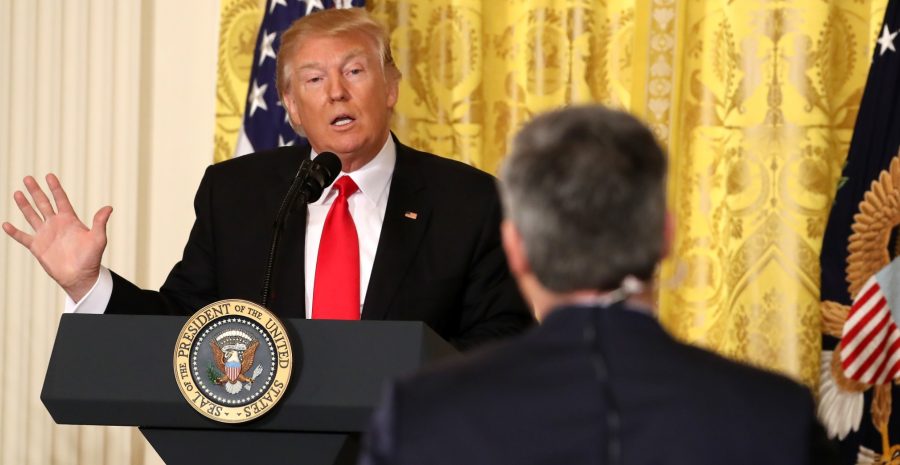Trump Versus the Media
A sea of reporters waited for the arrival of the 45th president to arrive for what would become a showdown between Donald Trump and the media. Last Thursday, Feb. 16, Trump decided to hold his first solo press conference since being sworn into the White House. However, by the middle of the meeting it seemed to be less of a press conference and more of a quarrel over the media’s position of power over Trump.
Trump started his extensive opening speech by announcing his nominee for secretary of the Department of Labor, Alex Acosta, who previously served on the National Labor Relations Board under George W. Bush. In addition, he also complained that Congress approved his pick for secretary of Office of Management and Budget, Mick Mulvaney, “weeks late.”
Trump went on to comment on jobs pouring out of the country and how he promises to defeat ISIS, saying that the terrorist group has “spread like cancer.” He then boasted that he had won his presidential race victory with the biggest margin in electoral college votes since Ronald Reagan. This is a false statement providing that in 2012 Barack Obama won with a margin of 126 electoral college votes versus Trump’s 74.
This lie wasn’t going to fly with the reporters in the audience. Following his statement, a reporter informed Trump that his statement was incorrect and then asked him if the American people can trust their president if he gives out false information.
“Well, I don’t know, I was given that information,” Trump responded, fighting against the reporter for the floor to speak. “I was given—I actually, I’ve seen that information around. But it was a very substantial victory, do you agree with that?”
Trump followed the night with a number of false statements that would later be shot down by reporters and fact checkers. While discussing plans to destroy drug cartels coming into the U.S., Trump stated that “drugs are becoming cheaper than candy bars.” Trump was criticized for this statement after the press conference by a number of different news sources and people on social media who called the comment far-fetched.
Trump continued his 30-minute “opening remarks” with actions that he and his administration have taken in the past four weeks. He discussed the building of the wall along the U.S.’ southern border, the revival of the Dakota Access Pipeline project, and his hopes for repealing and replacing Obama Care. Trump later commented that he would be announcing his new tax-care plan in mid-March of this year.
The first question of the night (which was off-mic) regarded Michael Flynn, the National Security Advisor, and why Trump asked for his resignation last Monday. Right off the bat, Trump reverted the topic and blamed the media for bad coverage of the situation.
“He didn’t have to do that because what he did wasn’t wrong,” Trump said. “What he did in terms of the information he saw. What was wrong was the way that other people, including yourselves in this room, were given that information, because that was classified information that was given illegally. That’s the real problem.” He then contradicted his previous answer and said that contact between Russian ambassadors and Michael Flynn never happened.
“And, you know, you can talk all you want about Russia, which was all a — you know — fake news, fabricated deal, to try and make up for the loss of the Democrats and the press plays right into it,” Trump said. “In fact, I saw a couple of the people that were supposedly involved with all of this — that they know nothing about it; they weren’t in Russia; they never made a phone call to Russia; they never received a phone call.”
But the initial question was never answered: why did Trump ask for Flynn’s resignation? In Trump’s eyes, what did Flynn do wrong? “You know, [Michael Flynn] was doing his job,” Trump said. “The thing is, he didn’t tell our vice president properly, and then he said he didn’t remember. So either way, it wasn’t very satisfactory to me.”
By this point, Trump was getting flustered with answering questions regarding Russia. One reporter asked Trump if he or his team members had any contact with Russia during his campaign trail. To this, he replied that “Russia is fake news.” Another reporter asked the President if the leaks about Flynn contacting Russia are true. His reply? The leaks are real, but the news written about it is “fake because so much of the news is fake,” he said.
He then said that the media’s approval rate is lower than Congress. This is a false statement; according to a survey done by Gallup in June of 2016, 40 percent of Americans had negative views on television news, but 60 percent had negative views of Congress.
A tense air had grown between Trump and the reporters. The reporters had found Trump’s weak point with the situation regarding Russian contact with Flynn. Nevertheless, Trump was ready to counterattack. After another reporter asked Trump about the situation with Flynn, he switched the topic of conversation to Hillary Clinton ‘cheating’ in the 2016 presidential debates.
“Which, by the way, nobody mentions,” Trump said. “Nobody mentions that Hillary received the questions to the debates. Can you imagine—seriously—can you imagine if I received the questions? It would be the electric chair. OK, he should be put in the electric—you would even call for the reinstitution of the death penalty, OK.”
The Clinton bashing didn’t stop there. Trump then stated that Clinton gave Russia 20 percent of the U.S.’s uranium supply. This is an incorrect statement; Trump is referring to Russia buying a Toronto-based company that owns mines in Utah, Wyoming and a few other U.S. states. These mills are equal to 20 percent of the U.S.’s production capacity, not produced uranium.
After insulting reporters and Clinton for about 90 minutes, the strangest moment of the night came when Trump became too flustered to answer any more questions on Russia. He then asked the sea of reporters for a “simple question.” He then picked out a random reporter and asked, “Are you a friendly reporter? Watch how friendly he is.”
The reporter, who wore a black velvet kippah (a skullcap worn typically by Orthodox Jews) stood up and introduced himself as Jake Turx, a writer for the magazine Ami. The reporter was concerned about an “uptick in anti-Semitism and how the government is planning to take care of it.”
Trump was flustered. “He said he was gonna ask a very simple, easy question,” Trump said. “And it’s not, it’s not, not — not a simple question, not a fair question.”
Trump went on to proclaim that he was the least racist and anti-Semitic person that “you have ever seen in your entire life.” He then said that the question was insulting and went on to call on another reporter.
It is questionable that Trump is the least racist person ever, but he did fail to recognize what the Congressional Black Caucus is: a political organization representing African-Americans in Congress. When an African-American reporter asked if Trump would include the CBC in his urban agenda for fixing inner cities, Trump asked the reporter if he was “friends with them” and if he could set up a meeting for them.
Among all the quarreling between Trump and the media finally came a moment of peace when a reporter asked about Melania Trump and her involvement as the first lady. Trump opened up about his wife and how the media treated her: “She was always the highest quality that you’ll ever find. And the things they say — I’ve known her for a long time — the things they say are so unfair. And actually, she’s been apologized to, as you know, by various media because they said things that were lies.”
After an hour of turmoil between Trump and reporters, nothing rang truer than his own self-assessment. “Tomorrow, they will say, ‘Donald Trump rants and raves at the press,’” Trump said. “I’m not ranting and raving. I’m just telling you. You know, you’re dishonest people.”




